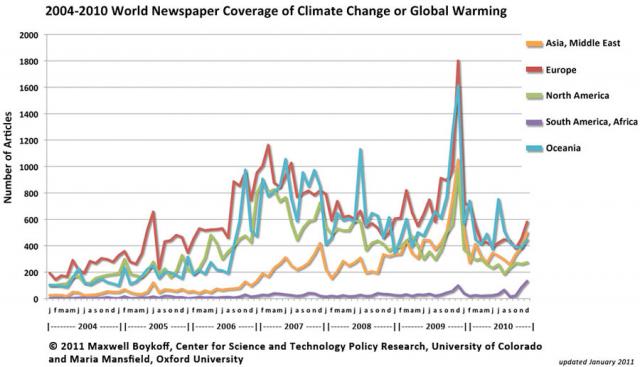Updated research from Max Boykoff and Maria Mansfield suggests that the world’s media have lost interest in climate change, regardless that the evidence of potential catastrophe becomes more clear by the day – and that last year was tied as the hottest on record.
World news coverage spiked in late 2009, corresponding with the intense interest among politicians, bureaucrats and activists in the Copenhagen conference of the United Nations Framework Convention on Climate Change.
This study, however, is quantitative rather than qualitative. Boykoff and Mansfield have scoured the electronic sources and found how many stories appear in prominent global newspapers. But this graph doesn’t answer whether what was being published was stupid or wrong. And previous Boykoff studies – beginning with the landmark 2004 study that he conducted with his brother Jules – have demonstrated that a stunning amount of media coverage was presenting an imagined version of reality that was not reflected in actual climate science.
That tendency – for example, to report a controversy that does not exist among the overwhelming majority of climate scientists – may account for the dminishing media and public interest in 2010. One of the biggest stories that captured world media attention around the time of the spike was related not to climate science, but to the wholly overblown “Climategate” controversy. Reporters covered trump-up accusations that climate science was somehow corrupt, but when those accusations were comprehensively disproved, those same reporters were less enthusiastic about following up with the corrections. Now, apparently, they just don’t want to talk about it.
One side note on an apparent sampling bias in the Boykoff/Mansfield figure: It appears from this graph that the geographic region least interested in climate change is Africa – which is arguably the continent that has already been affected the worst. A review of the papers in the B/M search shows that the only African source was the South African Paper, Business Day. Having no direct knowledge about that paper’s editorial bias, it’s probably best left to others to speculate about its enduring disinterest in the biggest environmental story humankind has ever faced.
Subscribe to our newsletter
Stay up to date with DeSmog news and alerts







